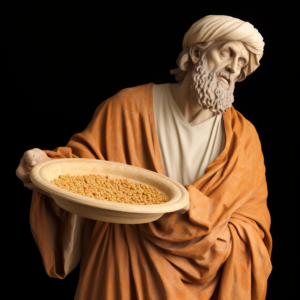Pythagoras, the ancient Greek philosopher and mathematician, is known for his contributions to the fields of mathematics and philosophy. However, his aversion to beans has well, it struck me as a bit weird. Look, I know some people cannot eat beans but beans are great man. Beans on toast, in stews in casseroles which are basically the same thing but baked (I think), on sandwiches, as a base for spreads, with pastas, with Mexican food, they’re just the best man, only the humble spud beats them.
So, nobody really knows the exact reasons behind yer man’s peculiar dietary restriction, there are a number of theories that offer insight into this strange subject.
Pythagoras and Beans
One theory suggests that Pythagoras and his followers may have avoided beans due to their potential to cause digestive discomfort (beans beans the wonderful fruit, the more you eat the more you toot). Beans are high in fiber and other nutrients that can be difficult for some people to digest, leading to bloating, gas, and other gastrointestinal issues. It’s likely that Pythagoras (along with his his band of merry men) believed that these digestive disturbances could interfere with their ability to think clearly and meditate effectively, leading them to avoid beans as a way of maintaining their focus and mental clarity.
Another theory suggests that the Pythagorean aversion to beans was rooted (pun intended) in their belief in the transmigration of souls. According to this theory, the Pythagoreans believed that all living beings, plants, animals, and humans, vampires, ninja turtles etc., shared a common soul or life force that could be reborn in different forms after death. In this context, beans may have been seen as particularly problematic, as they were believed to contain the souls of the dead. By avoiding beans, the Pythagoreans may have believed that they could avoid being contaminated by any potentially impure or malevolent spirits. It seems that beans were/are what you incarnate as if you’ve been a bad human. Lord knows how they came up with the logic for that but that what it appears to be.
What doesn’t make sense about this though is that what about other vegetables, wouldn’t carrots/beetroot/turnips/onions/garlic also contain these souls? Then again, onions and garlic may have been off the menu too because they can some belly troubles for those of us with sensitive guts. Spuds didn’t exist because they hadn’t been discovered. Tomatoes were in India I’m not sure if the ancient Greeks had them at the time. Regardless, pretty out-there idea.
Another possible reason for the Pythagorean aversion to beans could have been their association with poverty and low social status. In ancient Greece, beans were often considered to be the food of the common people, while more expensive and exotic foods were reserved for the wealthy and elite. By avoiding beans, Pythagoras and his followers may have been signaling their own status as members of a privileged intellectual and philosophical elite. Would they have done that? Well, possibly because like the Brahmin caste and Druid caste of Indo and ‘Celtic’ cultures Pyth-y and his mates were probably positioning themselves as a priestly class, so this one, along with the first reason seems the most likely.
The weirdest theory says that the Pythagorean aversion to beans may have been rooted in ancient Greek mythology. According to this theory, the god Hermes, who was known as the “psychopomp,” would transport the souls of the dead to the afterlife. Hermes is typically depicted holding his staff, otherwise called the Caduceus. Now, here’s the mad bit; some will claim that it’s topped with a bean (It isn’t, I’m really only including this one because it’s so cuckoo bananas) which was believed to have magical properties that could help guide the souls of the departed to their final resting place. As a result, some scholars (not many in fairness) believe that the Pythagorean taboo on beans may have been a way of showing respect for the dead and avoiding any potential interference with the passage of their souls. This one is just too mad to be true which means it may very well be.
Of course, it’s impossible to know for sure what motivated Pythagoras and his followers to avoid beans. Oh, there’s on more. Broad beans were used as anim fodder and the lad didn’t want to be seen eating the same things as the animals. I’ve experienced something like this. My in laws had a good laugh at me when they saw me eating porridge, they said that it’s food for horses. Well, yea, fine, sure, but if you want to be as fit and as strong as a horse you should probably eat like one eh?
We don’t really know why the triangle dude didn’t eat beans and we probably never will. But at least we had a bit of craic here.
Read More
- Blog: Why do Hindu and Buddhists bow?
- Vajrapani: The Protector and Guide of Gautama Buddha
- Blog: Two Christian Monks
- Reading/Watching: Philip K. Dick’s Valis
- Blog: The Demon Drink